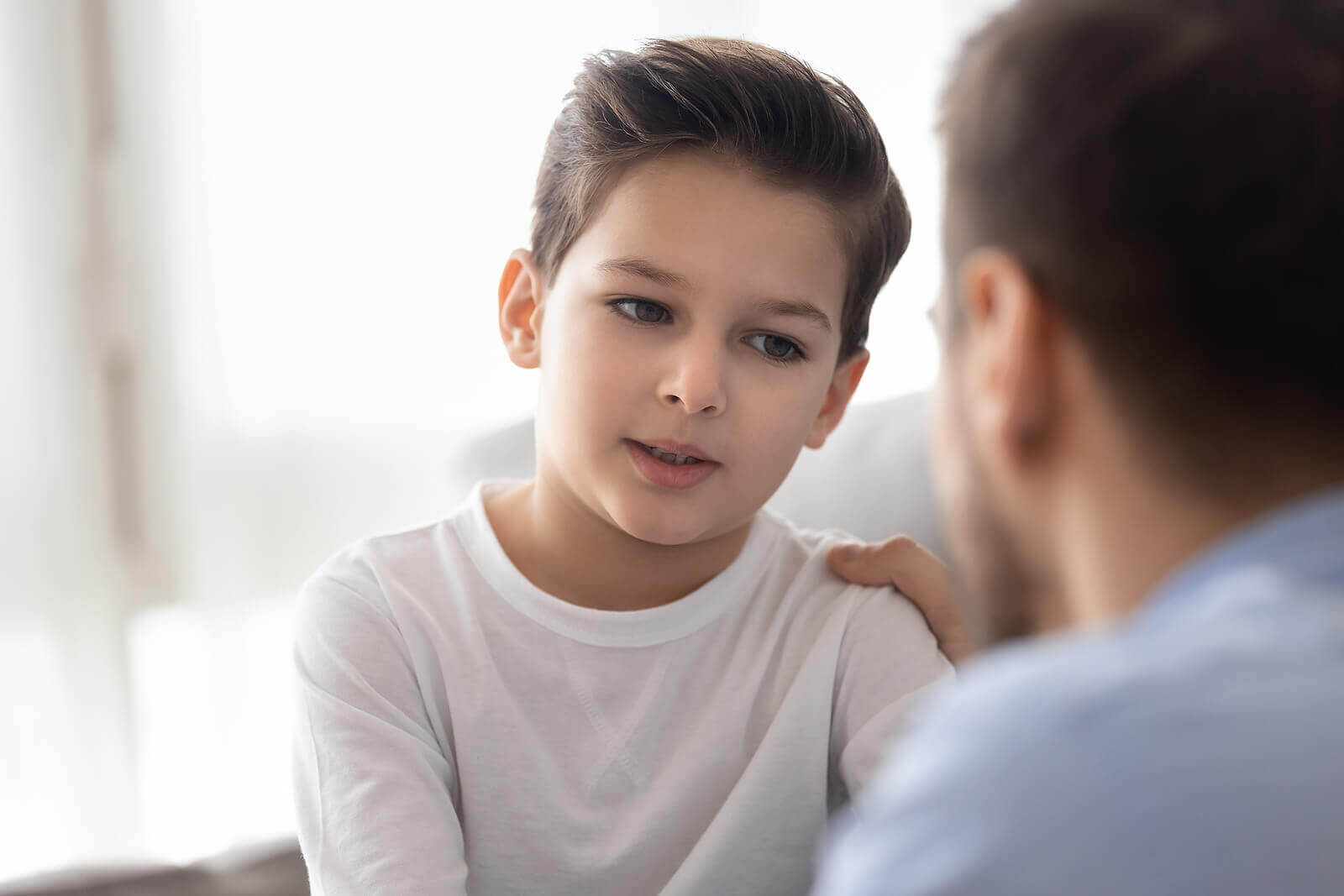How to Talk About Difficult Subjects with Children

Because children between the ages of 7 and 12 can read and write, they come into more contact with content that’s not age-appropriate. At this age, they’re still a little unsure about what’s real and what’s not. For many parents, having to talk about difficult subjects with children can be daunting. However, it’s necessary.
As young children acquire abstract thinking skills, real-world experience, and the ability to express themselves, they may have to deal with difficult issues and understand different perspectives.

How to talk about difficult subjects with children and pre-teens: 7 to 12 years old
Pre-teens are gradually separating from their parents emotionally. They’re entering puberty and interacting with the media more independently, coming into contact with violent video games, pornography, distressing news, and hate speech. Therefore, they need to be able to talk about things without being afraid or ashamed.
To be able to talk about difficult subjects with children and pre-teens, it’s a good idea to keep a few things in mind. This way, it’ll be easier for you to have these conversations and, furthermore, you’ll keep their age and maturity level in mind. In this case, we’re talking about children between the ages of 7 and 12.
Wait for the right moment
At this age, children will most likely come to you if they’ve heard something scary. However, sometimes you’re the one who must take the first step.
Find out what they already know
Ask your children what they’ve heard or if their friends at school are talking about something in particular. Answer their questions simply and directly, but try not to explain too much, as it might make them more afraid.
Create a safe space for conversation
You can say something like, “These topics are hard to talk about, even for adults. Let’s just talk about what you feel capable of. I won’t get mad and I want you to feel free to ask whatever you want.” That way, your children will feel confident enough to express themselves.
Provide context and perspective
Children need to understand the circumstances surrounding a problem in order to make sense of it. For a mass shooting, for example, you might say, “The person who did this had problems in his brain that confused his thoughts.”
For race-based crimes, try saying something like, “Some people mistakenly believe that they’re better than others based on the color of their skin. Without the right information, they sometimes commit crimes that they think are justified, but they’re not.”
Take curiosity into account when talking about difficult subjects with your children
If your child comes across adult material on the internet, it may be time to find content that allows them to learn about more mature topics in an age-appropriate manner.
You can say things like, “Internet pornography is something that some adults watch. But it’s not about love or romance and it can give you the wrong idea about sex. If you want to learn more about it, I can give you some books to look at and we can talk more if you have questions.”
Or if your child wants to explore serious topics in a greater depth than you can provide, you can say something like, “Let’s find some news sources that offer current events written for children.”
Be sensitive to children’s emotions and temperament
You never know what might trigger intense emotions in your child. Tell them how you feel and ask them how they feel. You can say something like, “I feel angry when I know someone has been hurt.”

Encourage critical thinking
Ask open-ended questions to get children thinking more deeply about serious issues. Ask things like, “What did you hear? What did you think? Why do you think that? For older children, you can ask, “Do you think families from other backgrounds would see this the same way we do?”
Look for the positive to talk about difficult things with children
There may not be a positive side to every cloud, but try to be optimistic. You can say things like, “Let’s find ways we can help. Try to instill in your children a positive mindset or growth mentality so they learn to see the bright side of things.
We hope that these tips for talking about difficult things with children will help you speak with the not-so-young people in your home and better address any questions or fears they may have.
Because children between the ages of 7 and 12 can read and write, they come into more contact with content that’s not age-appropriate. At this age, they’re still a little unsure about what’s real and what’s not. For many parents, having to talk about difficult subjects with children can be daunting. However, it’s necessary.
As young children acquire abstract thinking skills, real-world experience, and the ability to express themselves, they may have to deal with difficult issues and understand different perspectives.

How to talk about difficult subjects with children and pre-teens: 7 to 12 years old
Pre-teens are gradually separating from their parents emotionally. They’re entering puberty and interacting with the media more independently, coming into contact with violent video games, pornography, distressing news, and hate speech. Therefore, they need to be able to talk about things without being afraid or ashamed.
To be able to talk about difficult subjects with children and pre-teens, it’s a good idea to keep a few things in mind. This way, it’ll be easier for you to have these conversations and, furthermore, you’ll keep their age and maturity level in mind. In this case, we’re talking about children between the ages of 7 and 12.
Wait for the right moment
At this age, children will most likely come to you if they’ve heard something scary. However, sometimes you’re the one who must take the first step.
Find out what they already know
Ask your children what they’ve heard or if their friends at school are talking about something in particular. Answer their questions simply and directly, but try not to explain too much, as it might make them more afraid.
Create a safe space for conversation
You can say something like, “These topics are hard to talk about, even for adults. Let’s just talk about what you feel capable of. I won’t get mad and I want you to feel free to ask whatever you want.” That way, your children will feel confident enough to express themselves.
Provide context and perspective
Children need to understand the circumstances surrounding a problem in order to make sense of it. For a mass shooting, for example, you might say, “The person who did this had problems in his brain that confused his thoughts.”
For race-based crimes, try saying something like, “Some people mistakenly believe that they’re better than others based on the color of their skin. Without the right information, they sometimes commit crimes that they think are justified, but they’re not.”
Take curiosity into account when talking about difficult subjects with your children
If your child comes across adult material on the internet, it may be time to find content that allows them to learn about more mature topics in an age-appropriate manner.
You can say things like, “Internet pornography is something that some adults watch. But it’s not about love or romance and it can give you the wrong idea about sex. If you want to learn more about it, I can give you some books to look at and we can talk more if you have questions.”
Or if your child wants to explore serious topics in a greater depth than you can provide, you can say something like, “Let’s find some news sources that offer current events written for children.”
Be sensitive to children’s emotions and temperament
You never know what might trigger intense emotions in your child. Tell them how you feel and ask them how they feel. You can say something like, “I feel angry when I know someone has been hurt.”

Encourage critical thinking
Ask open-ended questions to get children thinking more deeply about serious issues. Ask things like, “What did you hear? What did you think? Why do you think that? For older children, you can ask, “Do you think families from other backgrounds would see this the same way we do?”
Look for the positive to talk about difficult things with children
There may not be a positive side to every cloud, but try to be optimistic. You can say things like, “Let’s find ways we can help. Try to instill in your children a positive mindset or growth mentality so they learn to see the bright side of things.
We hope that these tips for talking about difficult things with children will help you speak with the not-so-young people in your home and better address any questions or fears they may have.
This text is provided for informational purposes only and does not replace consultation with a professional. If in doubt, consult your specialist.








